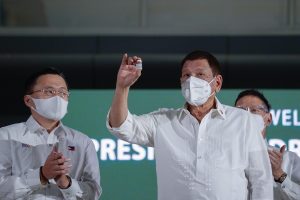[ad_1]

President Rodrigo Duterte holds up a vial of the AstraZeneca COVID-19 vaccine after the arrival of the first shipment of the vaccine in the Philippines, March 5, 2021.
Credit: Facebook/Rody Duterte
The Philippine Congress adjourned its sessions this month without tackling bills on federalism, a key legislative proposal of President Rodrigo Duterte since his campaign for president in 2016.
The leaders of the House of Representatives and the Senate cited the achievement of legislators in passing laws intended to boost the country’s pandemic response. They highlighted the cross-party unity in expediting the passage of a law that will provide cash assistance to Filipino households. The House said it enacted 91 laws while the Senate passed 72 laws.
Missing in the list of bills deliberated by Congress, however, was the federalism proposal, which didn’t even merit a mention in the press statements of the House speaker, Senate president, and the Office of the President.
Congress will resume its sessions next month, at which point it is expected that both chambers will focus on passing the budget bill before the unofficial start of election campaigning in the last quarter of the year. The presidential election is scheduled for May 2022.
Since federalism would lead to a fundamental shift in the form of government, it entails continuous dialogue and consultation with a wide range of stakeholders and interest groups. Given that voters would also have to ratify it in a plebiscite, there is simply no time remaining to do this. Political parties are now gearing for the 2022 election and it’s unlikely that they will give special attention to the federalism bill, a proposal that could prove divisive and unpopular among voters.
It is safe to conclude that Duterte has already abandoned his campaign promise of adopting federalism. He has stopped mentioning it in his speeches. His party, which has been pushing the federalism bill for many years, recently held a meeting and approved a controversial resolution urging him to run as vice president in 2022. Duterte is barred by the constitution from seeking reelection as president. There was no discussion about the inclusion of federalism in the priority agenda of Congress.
How will Duterte’s supporters react to this? Even if he became popular by presenting himself as a crime-buster, he also got strong support from the provinces after he vowed to redistribute power and wealth by adopting federalism. He railed against the Manila-centric bureaucracy and promised to empower local governments by shifting to a federal system of governance. He consistently espoused federalism during his first year as president and vowed that this would be the legacy of his presidency.
The last major push for federalism took place in 2018 when provincial assemblies were organized to explain it to local residents. After that it was not formally abandoned as a goal but many of its proponents, including Duterte, suddenly became quiet about it.
Federalism can be included in the list of election promises that Duterte has failed to achieve. His supporters cannot blame the pandemic for disrupting the work of Congress, since legislative leaders are claiming that they are working closely with the executive in processing priority bills. Despite the pandemic, Congress found the time to pass major laws such as the revised Anti-Terrorism Act, tax reforms, and even the bill seeking to amend the economic provisions of the constitution.
Federalism was supposed to stimulate the local economy by increasing the revenue share of provinces and enticing local industries to boost their production. But instead of pursuing this, the House of Representatives devoted its time to approving the proposal to allow foreign ownership of resources and industries through an amendment to the constitution. This reflects the economic priorities of the government, which has relied on foreign investments to raise capital and create jobs. The so-called “Dutertenomics,” originally anchored in introducing federal reforms in order to expand the wealth of the provinces, has become indistinguishable from what previous governments have done in terms of keeping the economy afloat.
Duterte and his party will enter the election race with few concrete accomplishments. The bloody “war on drugs” was a failure even as it led to thousands of killings; the peace process with communist insurgents has been scuttled; the resistance to China’s military buildup in the South China Sea has been reluctant; and now Duterte’s vision of federalism has been shelved with no explanation. Duterte still talks about the drug menace, the all-out-war against communists, and his close ties with the government in Beijing, but seems now to have forgotten his federalism agenda. Curiously, his detractors also have nothing to say about it.
It is Duterte’s prerogative to name the priorities of his government as he enters his last year in office. Today, he can afford to be mum about what happened to the federalism proposal but he cannot remain silent once voters – especially those who supported him in the provinces – begin demanding an explanation during next year’s presidential campaign.
[ad_2]
Source link